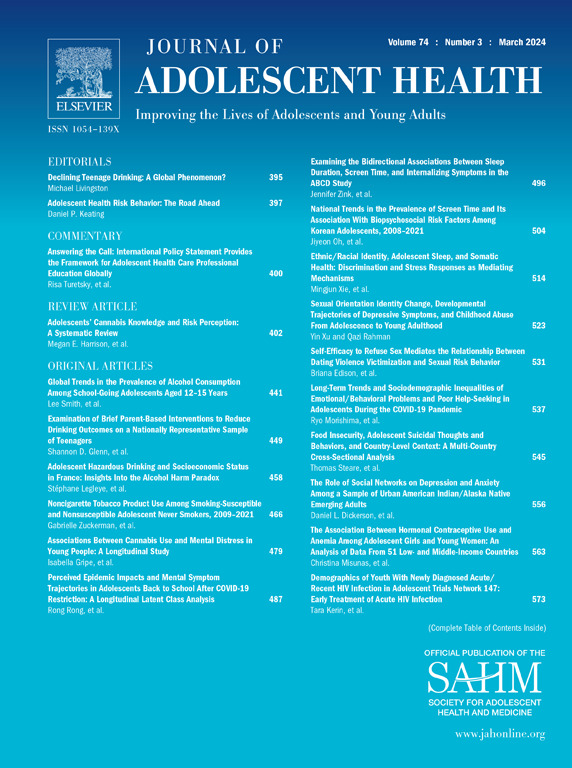Choice Matters: The Moderating Effect of Choice on the Relationship Between Mental Health Personal Recovery and Symptomatology
IF 5.5
2区 医学
Q1 PEDIATRICS
引用次数: 0
Abstract
Purpose
Limited research examines how choice surrounding treatment impacts mental health recovery among young adults with serious mental illness (SMI) who are navigating symptom management, complex mental health systems, and developmental expectations of increased independence. This study examines whether perceived choice related to mental health treatment impacts the relationship between symptomatology and personal recovery among Black, Latino/e, and multiracial young adults with SMI.
Methods
Surveys were conducted with 121 young adults with SMI attending a community-based personal recovery-oriented program. Data included covariates (demographics and social support), psychiatric symptomatology, personal recovery, and choice. Ordinary least squares regressions tested whether choice predicts symptomatology and personal recovery, and whether choice moderates the relationship between symptomatology and personal recovery.
Results
Most participants were Black, Latino/e, or multiracial (96%) and male (67%) with an SMI diagnosis receiving services through Medicaid. Holding demographics and social support constant, a strong sense of choice was positively associated with personal recovery, (χ2 (7, N = 112) = 17.5, p = .01), but not symptomatology (χ2 (7, N = 112) = 12.5, p = .09). Furthermore, perceived choice moderated the relationship between symptomatology and personal recovery (β = −0.48, 95% CI [-0.79, −0.17], p = .012), where the association between symptomatology and personal recovery ceased to exist at lower levels of perceived choice in treatment.
Discussion
This study suggests perceived choice can influence the relationship between symptomatology and personal recovery among Black, Latino/e, and multiracial young adults with SMI. Implications for clinical practice include further evidence for enhancing shared decision-making and transition-focused care for young adults of color.
选择很重要:选择对心理健康个人康复与症状之间关系的调节作用》(The Moderating Effect of Choice on the Relationship Between Mental Health Personal Recovery and Symptomatology)。
目的:对于患有严重精神疾病(SMI)的年轻成年人来说,他们需要应对症状管理、复杂的心理健康系统以及对提高独立性的发展期望,而有关治疗选择如何影响他们的心理健康恢复的研究十分有限。本研究探讨了与心理健康治疗相关的感知选择是否会影响患有严重精神疾病的黑人、拉美裔和多种族年轻人的症状与个人康复之间的关系:对 121 名参加社区个人康复项目的 SMI 患者进行了调查。数据包括协变量(人口统计学和社会支持)、精神症状、个人康复和选择。普通最小二乘法回归检验了选择是否能预测症状和个人康复,以及选择是否能调节症状和个人康复之间的关系:大多数参与者为黑人、拉丁裔/e 族或多种族(96%),男性(67%),被诊断为 SMI,通过医疗补助计划接受服务。在人口统计学和社会支持不变的情况下,强烈的选择感与个人康复呈正相关(χ2 (7, N = 112) = 17.5, p = .01),但与症状无关(χ2 (7, N = 112) = 12.5, p = .09)。此外,感知选择调节了症状和个人康复之间的关系(β = -0.48,95% CI [-0.79, -0.17],p = .012),在治疗中感知选择水平较低时,症状和个人康复之间的关系不复存在:讨论:本研究表明,在患有 SMI 的黑人、拉丁裔美国人和多种族年轻人中,感知选择会影响症状与个人康复之间的关系。该研究对临床实践的启示包括:为有色人种的年轻成年人提供更多证据,以加强共同决策和以过渡为重点的护理。
本文章由计算机程序翻译,如有差异,请以英文原文为准。
求助全文
约1分钟内获得全文
求助全文
来源期刊

Journal of Adolescent Health
医学-公共卫生、环境卫生与职业卫生
CiteScore
10.40
自引率
3.90%
发文量
526
审稿时长
46 days
期刊介绍:
The Journal of Adolescent Health is a scientific publication dedicated to enhancing the health and well-being of adolescents and young adults. Our Journal covers a broad range of research topics, spanning from the basic biological and behavioral sciences to public health and policy. We welcome a variety of contributions, including original research papers, concise reports, literature reviews, clinical case reports, opinion pieces, and letters to the editor. We encourage professionals from diverse disciplines such as Anthropology, Education, Ethics, Global Health, Health Services Research, Law, Medicine, Mental and Behavioral Health, Nursing, Nutrition, Psychology, Public Health and Policy, Social Work, Sociology, and Youth Development to share their expertise and contribute to our mission of promoting adolescent health. Moreover, we value the voices of young individuals, family and community members, and healthcare professionals, and encourage them to submit poetry, personal narratives, images, and other creative works that provide unique insights into the experiences of adolescents and young adults. By combining scientific peer-reviewed research with creative expressions, our Journal aims to create a comprehensive understanding of the challenges and opportunities in adolescent and young adult health.
 求助内容:
求助内容: 应助结果提醒方式:
应助结果提醒方式:


